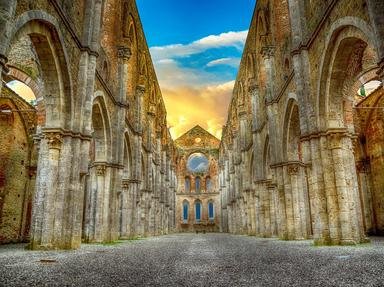Quiz Answer Key and Fun Facts
1. 'No free man shall be taken or imprisoned or outlawed or exiled ... except by the lawful judgement of his peers or by the laws of the land'. From which document is this?
2. The son of Joan, Fair Maid of Kent, he was born in 1367, and his reign was marked by disunity and civil strife. Who was this king?
3. The fourth son of William the Conqueror and the third Norman King of England, he was born at Selby in AD 1068. Who was it?
4. Which of the following battles in the Hundred Years' War is the odd one out?
5. Name the English kings who died in the following years:
a)1399
b)1189
c)1216
d)1307
6. Born in 1207, I was the son of one of the most unpopular kings of England. I had ascended the throne at age of nine and during my minority my kingdom was ruled by William Marshal and Hubert de Burgh. My wife was Eleanor of Provence whom I married in 1236. Whom am I?
7. This battle, which took place on 22 June 1372 between a Castilian-French and an English fleet, was the sixth battle which occured between the French and the English during the Hundred Years' War. Despite the French having only 22 ships against the English 50 vessels, the battle ended with the defeat of England.
8. This crusade was led by Louis IX of France from 1248 to 1254. Edward I of England (still a prince) also played a part in it. However, it was a disaster as King Louis, along with thousands of his troops, got captured and was defeated by the Egyptian army led by the Ayyubid Sultan Turanshah. Name this crusade.
9. The son of Queen Catherine of Valois, this king of England founded Eton College and King's College, Cambridge as well as the University of Caen.He was venerated by many as a saint because of his piety. It was during his reign that the Hundred Years' War was lost by England and the War of Roses had began. Name this king.
10. His coronation came after a protracted civil war sometimes called "The Anarchy". He was an important administrative reformer and this English king owned more lands in France than the French king himself. He established the system of assize courts, but died in 1189 feeling his efforts had been a complete waste, because of the rebellious nature of his sons.
Source: Author
sandarsh
This quiz was reviewed by FunTrivia editor
bloomsby before going online.
Any errors found in FunTrivia content are routinely corrected through our feedback system.
